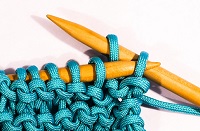Binding off is used to close open stitches so that the knitting does not run
 Binding off is used to close open stitches so that the knitting does not run or fall apart once it is removed from the needles. Most often this occurs when a knitted piece is finished and all stitches are bound off. However, it is also used to close a few stiches as in underarm shaping, vee necks, or buttonholes. Less frequently it is used as a decrease.
Binding off is used to close open stitches so that the knitting does not run or fall apart once it is removed from the needles. Most often this occurs when a knitted piece is finished and all stitches are bound off. However, it is also used to close a few stiches as in underarm shaping, vee necks, or buttonholes. Less frequently it is used as a decrease.To bind off, start by working two stitches in pattern as shown in the top photo.

 Then pull the first worked stitch over the second worked stitch by using the tip of the left needle to pick up the first knitted stitch on the right needle. Now work one new stitch in pattern. Pull the old right most stitch over the newly formed stitch. (Third picture shows several stitches below the right needle that have already been bound off.)
Then pull the first worked stitch over the second worked stitch by using the tip of the left needle to pick up the first knitted stitch on the right needle. Now work one new stitch in pattern. Pull the old right most stitch over the newly formed stitch. (Third picture shows several stitches below the right needle that have already been bound off.)Continue working one new stitch at a time and pulling the older stitch over it until only one stitch remains on the right needle.
 That last remaining stitch needs to be sealed off. Cut yarn, allowing enough length for seaming and finishing. Pull the cut end through that last stitch on the needle, as shown in last picture.
That last remaining stitch needs to be sealed off. Cut yarn, allowing enough length for seaming and finishing. Pull the cut end through that last stitch on the needle, as shown in last picture.This bind off is not very stretchy! In fact, it is usually much less stretchy than the knitted fabric. I almost always use a needle at least one size larger than what I used to knit the fabric. If I want to match the stretch of the fabric, then two needle sizes bigger is usually the correct size. I once used needles five sizes larger for the bind off on a child's neckline. The stitches looked a bit odd (more like a crochet edge), but the sweater went over the child's head easily!
If I want to match the stretch of the fabric, then two needle sizes bigger is usually the correct size. I once used needles five sizes larger for the bind off on a child's neckline. The stitches looked a bit odd (more like a crochet edge), but the sweater went over the child's head easily!
 If I want to match the stretch of the fabric, then two needle sizes bigger is usually the correct size. I once used needles five sizes larger for the bind off on a child's neckline. The stitches looked a bit odd (more like a crochet edge), but the sweater went over the child's head easily!
If I want to match the stretch of the fabric, then two needle sizes bigger is usually the correct size. I once used needles five sizes larger for the bind off on a child's neckline. The stitches looked a bit odd (more like a crochet edge), but the sweater went over the child's head easily!
